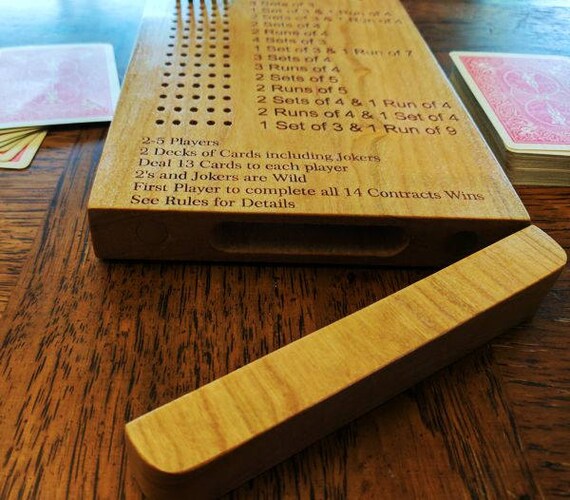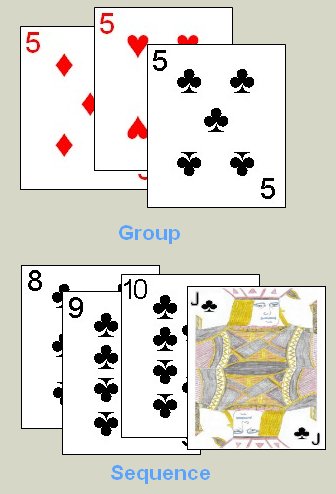Contract Rummy
Advertisement California Rummy is a 3 – 8 player variant of the standard deck playing card game Contract Rummy. Seven hands are played with each initial meld requirement of “sets” and/or “runs”. Contract rummy is a Rummy card game, based on gin rummy played by 3 to 8 players. It is also known as Combination rummy, Deuces Wild Rummy, Joker rummy and Phase 10. Contract rummy is a Rummy card game, based on gin rummy played by 3 to 8 players. It is also known as Combination rummy, Deuces Wild Rummy, Joker rummy and Phase 10. Contract Rummy is an exciting version of Rummy that can be played by 3-4 players shuffling 2 decks of cards and a joker. However, when 5 or more players play this card game then 3 decks are shuffled and 2 jokers are used. This thrilling card game is best enjoyed when the Contract Rummy rules are understood and a strategy is followed.
Contract Rummy is a rummy style game for three to eight players. Be first to play your cards into specific melds based on the round number in order to help you win this game! Find the video tutorial and written explanation for how to play contract rummy below.
Contract Rummy Tutorial
Needed
Three to eight players; Two 52 card decks with a joker for three or four players. You will need a third deck and another joker for five to eight players.
Deal
The game is played over seven deals. For the first four deals, each player will receive ten cards. In the last three deals, each player will receive 12 cards.
After the deal, the remaining deck is placed into the middle, and the top card is flipped over to form a discard pile.
Objective
The object of the game is to score the least amount of points during the game. Each round, the goal is to create specific types of melds with your cards depending on the deal you are in.
A meld can be a group with three cards of the same rank or a sequence with three cards in a row of the same suit. Each deal has a specific combination of melds for the players to try and get.
Melds
First Deal: Two groups
Second Deal: One group and one sequence
Third Deal: Two sequences
Forth Deal: Three groups
Fifth Deal: Two groups and one sequence
Sixth Deal: One group and two sequences
Seventh Deal: Three sequences (with no unmatched cards)
Game Play
The player left of the dealer is first to play. The player has the option to take the top discard or the top card from the deck. If the player wants the top card from the deck, all other players have the option to take the top card from the discard pile.
If a player draws a discard out of turn, the player must also draw a card from the deck as a penalty. After drawing out of turn, the play returns to the original player to draw from the deck.
After drawing, a player can make a meld, if possible. The first meld a player makes must be the specific meld combination for the round. Finally, a player's turn will end by discarding one card.
After a player has made the initial meld, they are able to lay off cards onto their own or other players' melds.
Once a player has melded all their cards, the round is over.
Scoring
Contract Rummy How Many Decks

At the end of the round, players will score points for the amount of cards left in their hands.
Aces/joker = 15 points
Kings/Queens/Jacks = 10 points
10s to 2s = face value
The scores are recorded. The deal moves clockwise left to the next player, and all players will try for the next deal combination in the round.
Winning
The player with the lowest score after the seventh deal wins the game!

Rules
For rounds one through six, the initial meld of a group or sequence is three cards. In round seven, a player needs to use all their cards in three sequences of cards for their initial meld. This means when a player makes the first meld, the game is over.
Only the specific round's meld combination can be melded by each player. All other cards in hand must be laid off and cannot be used to create another separate meld.
The joker is a wild card and can be used in a group or a sequence. When used is a sequence, the player with the card the joker is being used for can lay it off to replace the joker and move the joker to either end of the sequence.
Anytime a deal calls for multiple sequences, the sequences must be separate. A sequence of six cannot be used as two sequences of three. When the initial sequence melds are separate, a connecting card can be laid off later, but the sequences remain separate.
The ace can be in a sequence below the 2 or above the king, but king, ace, 2 is not a valid sequence.
12-Step Rummy is yet another Contract Rummy game, with a differentset of basic contracts that must be completed (12 of them) and a few other minorrule variations. The main distinctive difference, other than the 12 contracts,is that if a player does not complete the basic contract in one round, they mustcontinue to work on that contract in the next round. They can not move on to thenext contract until they have completed the former.
Objective
To be the first player to complete all twelve combinations or contracts. In thecase of two players completing the 12th contract in the same round, the one withthe least points wins.
Setup
For a game with 2 to 5 players use 2 standard decks plus jokers (108 cardstotal). Add another deck and its jokers for each 2 additional players. Deal 13cards to each player, starting at the dealer's left.
Melding
Deuces and jokers are wild cards. In a set wild cards may be placed side by side,but in a run they must be separated by a 'real' card. Aces may be counted ashigh or low in runs (i.e., A-2-3-4 and J-Q-K-A are both legalcombinations).
Game Play
In addition to, or instead of, the rules for Contract Rummy the followingitems are relevant for 12-Step Rummy:

- Players may draw either the top card from the stock pile or the top card fromthe discard pile, but 1 card must be picked up before commencing play and 1card must be discarded at the end of his or her turn.
- In order to make the contract, all required combinations must be laid downat the same time.
- A player may lay off cards on their own or another player's melds onlyafter they have fulfilled their own contract, but they do not need to waituntil the following turn to do so.
- One player may 'liberate' another's wild card by replacing it with the cardit represents. Players are not allowed to liberate their own wild cards andthe wild card can not be kept in their hand and must be played immediately.
- A player may make only one contract per round. If he does not make thecontract in a given round, he must continue working on it in subsequent roundsuntil it is made before going for the next combination.
- If the stockpile runs out before play has finished, take all of the cardsin the discard pile except for the top one, shuffle them and start a newstockpile.
Contracts
| Contract # | Contract Details |
|---|---|
| 1 | 2 sets of 3 |
| 2 | 1 set of 3, 1 run of 4 |
| 3 | 2 sets of 4 |
| 4 | 2 runs of 4 |
| 5 | 3 sets of 3 |
| 6 | 1 set of 4, 1 run of 4 |
| 7 | 1 set of 3, 1 run of 7 |
| 8 | 2 sets of 3, 1 run of 4 |
| 9 | 2 sets of 5 |
| 10 | 2 runs of 5 |
| 11 | 1 set of 8 |
| 12 | 1 run of 10 |
Scoring
Although the winner is typically determined by who fulfills all 12 contractsfirst, the accumulated score of all rounds leading up to that point is used as atie breaker if more than one player completes the 12th contract in the sameround.
| Card | Value |
|---|---|
| Wild card | 50 points |
| Ace | 20 points |
| Face cards | 10 points |
| 3 to 9 | 5 points |
Refer to Contract Rummy for any details that may not be presented here.
Optional Rules and Variations
The following rules may be added to the standard game if all players agree tothe variation before the first player takes their turn. It’s not an all ornothing deal, the game participants can pick and choose which variations theylike.
- Dummy Rummy: I've seen one variation of this game called Dummy Rummythat only differs in that the requirement to complete a contract beforemoving on to the next doesn't exist. In this version of the game thecontracts are based on the round number, like in other Contract Rummy games.Naming this variant is unfortunate as that name seems to be used for lots ofvery different kinds of Rummy variations...
- The 'May I?': The Buy or May I? step of Contract Rummy may beeliminated from this game if desired.
Contract Rummy

